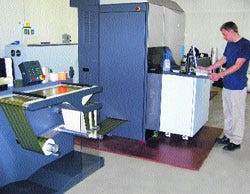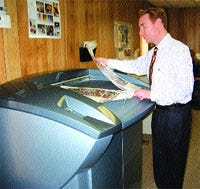Digital printing launches natural bath and body products
January 29, 2014
Natural personal care and organic food marketer FoodLogic LLC, Newton, MA, is on a mission to "democratize" luxury bath and body products for the mass market. Designing custom-formulated skincare lines using the principles of aromatherapy and holistic healing, FoodLogic develops private-label products for retailers that can compete with national brands. "Our entire team comes out of the high-cost bath and body, skincare and fragrance business," explains FoodLogic CEO Florence Sender. "We've basically taken the products that people usually buy for anywhere from twenty to sixty dollars, and we have recast them for the supermarket, without intruding on the quality."
As Sender points out, image is essential in marketing luxury personal care products. And, for FoodLogic, the ability to tailor formulations and packaging to meet each of its global customers' specific demographic needs is equally critical. Therefore, she notes, the printer FoodLogic chose to supply its product labels and supporting marketing materials had to meet "very rigorous standards."
"Like everyone, we were looking for cost-efficiencies and responsiveness, because execution is key," Sender says. "If you're dealing with a Kroger or a Target or a supermarket chain in Japan, timely delivery and replenishment are vital."
Still in the startup phase, FoodLogic approached Brooklyn, NY-based Prestige Label Co., Inc. four years ago to discuss converting options and, in particular, Prestige's digital printing capabilities. "That was the beginning of the relationship, which was fundamentally about information exchange," Sender recalls. "They learned about us; we learned about them. They taught us how we could use a variety of their capabilities, and in this rapid growth spurt that we've had, they've been there. We found the solutions to our problems."
|
Labels are produced in seven colors using a digital offset press that allows Prestige to create short runs cost-effectively. |
Digital printing enables innovation
As Sender explains it, converging trends in the retail market and in consumer preferences over the past several years have set the stage for FoodLogic's rapid success. In the retail environment, where smaller companies are struggling to compete with large discount merchandisers, there is a need for value-added products that can provide consumers with more than just a low price. "We see ourselves as the innovators in the space for value-added private-label products that help the retailer manage their battles with the discount giants and provide their customers with quality products at a fair price," says Sender.
And, natural products provide the perfect platform, she says, as sales statistics indicate that naturals and organics for wellness and health are the areas of fastest growth. "You can't turn anywhere without the health stress conversation," she adds. "People are yearning to find out how they can take better care of themselves."
With its personal care items, FoodLogic combines both functional and aesthetic elements to create "a state of mind." Products are categorized as calming, nourishing or energizing, depending upon their core ingredients. For example, evening primrose and sage are used for their calming effect in products such as body lotions and oils. Chamomile, hibiscus and papaya give one retailer's body wash, body lotion and foaming milk bath products their nourishing aspects. And, some revitalizing formulas use combinations of ingredients like rosemary and watermint, ylang ylang and peach milk, and juniper and lime juice.
FoodLogic custom-designs each product and its packaging specifically to suit the demographics of the retailer's customer and the requirements of the retailer's own private-label brand. "So we are often very creative about the delivery system," explains Sender. "We have a group of designers who design the packaging to message it, and then develop the copy to support it."
Digital printing technology has played a large role in enabling such customization of products. Eliminating the need for costly printing plates and providing variable-printing capabilities, digital printing has allowed FoodLogic to create sophisticated comps and short runs for test markets, as well as long runs comprising several different label versions. "We can go back and change things without the cost or penalties," explains Sender. "Also, they are beautiful, absolutely beautiful."
Different processes, different efficiencies
Since the purchase of its first digital offset press, the Indigo Omnius Webstream, in early 2001, Prestige Label Co. has invested well over $1 million in digital printing technology. Says Prestige president Elisha Tropper, "We felt that this money would be best utilized pioneering what will certainly be one of the key label-printing technologies in the near future."
Last October, Prestige acquired a second press, the HP ws/4000 from HP Indigo (formed when Hewlett-Packard acquired Indigo), which replaced the first machine in Prestige's 18,000-sq-ft manufacturing plant in Burgaw, NC. With seven-color printing capabilities and an output rate of up to 50 ft/min for four-color process, the ws/4000 effectively doubles the speed of its previous six-color Webstream press. According to Terie Syme, operations manager for Prestige, the company hopes to use the new press to build its digital printing business to between 15 percent and 18 percent of its sales. Prestige's primary business is high-definition flexo printing and converting of pressure-sensitive labels, tags and flexible packaging (see PD, Nov., '03, p. 60).
For customers such as FoodLogic, Prestige's ability to produce both digital and flexo-printed products enables the marketer to build its brands through short runs before moving to the long runs associated with flexo printing. Costing and pricing modules developed by Prestige that include variables such as job run length, label size, materials, turnaround time and number of changes within a run, help the converter ascertain the most cost-efficient method for any particular job.
Relates Sender, digital printing is invaluable in the product-branding phase. "Very often we produce something, and after it's on the shelf for a while, we will learn through focus groups what corrections are required to message the item properly," she says. "So, the changes to the label are basically free. Once we have proven a product in the marketplace, and it's an ongoing business, we can move from digital to flexo for the cost savings."
Printed primarily on 2-mil clear polypropylene labels, as well as on 2-mil white PP label stock, both supplied by Fasson, FoodLogic's personal care labels range in size from 232 in. up to 45/8353/4 or 336 in.?well within the digital press's 13317-in. maximum image size. Other products printed for FoodLogic on the HP Indigo include tent cards and header cards on .012 C1S stock for point-of-purchase and marketing use in 8310- and 8312-in. sizes.
|
To move a label-printing job from digital to flexo, Prestige first makes a proof using a digital proofer. |
Notes Syme, there is no concrete run-length amount at which Prestige will move a job from digital to flexo; it all depends upon the aforementioned variables. "We've done runs for FoodLogic on the digital press up to 160,000 labels," she says.
Enhanced color, quality capabilities
In addition to its greater speed capabilities, the 800-dpi ws/4000 digital press also provides Prestige with "fantastic print quality," notes Syme. "You don't have any registration issues. It definitely produces a much sharper, cleaner dot."
Quality and color consistency are achieved through the use of Harlequin screening technology from Global Graphics Software, as well as an online spectrodensitometer. Enhanced color lookup tables in the press's software also provide greater editability.
The ws/4000, which uses HP Indigo's patented HP ElectroInk liquid inks, is equipped with seven stations for almost unlimited color reproduction. FoodLogic's jobs typically run in four-color process, along with two "hits" of white for opacity, explains Syme. "We also have orange and violet in the press at all times," she adds, "so if we need to use either one of those to build up a red or an orange or a blue, we can."
To custom-mix those colors that are difficult to reproduce with the existing seven colors, Prestige has invested in an HP Indigo ink-mixing system.
After printing, FoodLogic's labels are either UV-coated or laminated, die-cut and slit on equipment custom-built by Rotoflex.
Transitioning to flexo
Once a FoodLogic product has been proven in the field and is ready for longer-run production, its labels may be moved onto one of Prestige's two 13.75-in. 3513 Nilpeter Roto flexo presses. While retaining print consistency when moving from one printing process to another can sometimes pose a challenge, Sender says Prestige has made such transitions without any problems. "At first when our designers worked with Prestige, they were very suspicious about how you move from digital to flexo, and what would happen with the quality of the work," she says. "But now, our designers are comfortable with Prestige because they know that Prestige is as concerned about the quality of the end product as they are."
To move a product from digital to flexo, Prestige begins by creating a proof on its DuPont digital Chromalin® proofing system, which is calibrated to its Nilpeter presses. From there, color adjustments are made, and if necessary, conversions are made from four-color process to spot colors, or special colors are mixed.
Efficiencies throughout
In reflecting on the choice made by FoodLogic to use Prestige to supply one of the most important components of its luxury skincare products, Sender is enthusiastic. "When I talk about efficiencies, I'm looking right up and down the line," she says. "So the first efficiency is whether I get an effective response from retailers and consumers to the designs of the actual label that I have. And, that's been a terrific process, without being loaded with problems. The next piece of efficiency is that I get a rapid response at the lowest possible price without risking huge inventories. Prestige has helped me manage inventory risk, allowing us to get up to speed with a product to determine its sell-through rate, before investing in flexo printing."
More information is available:
Label converter: Prestige Label Co., Inc., 877/277-3784. www.prestigelabel.com. Circle No. 205.
Digital press, inks, ink-mixing system: HP Indigo, 847/330-4000.www.indigonet.com. Circle No. 206.
Label stock: Avery Dennison Corp., Fasson div., 800/944-8511. www.na.fasson.comwww.na.fasson.com. Circle No. 207.
Screening technology: Global Graphics Software, Inc., 703/266-9588. www.globalgraphics.com. Circle No. 208.
Finishing system: Rotoflex USA, 800/387-3825. www.rotoflex.com. Circle No. 209.
Flexo presses: Nilpeter, Inc., 954/385-8835. www.nilpeter.com. Circle No. 210.
Digital proofer: DuPont Color Proofing, 800/345-9999. www.dupont.com/proofing. Circle No. 211.
About the Author(s)
You May Also Like




